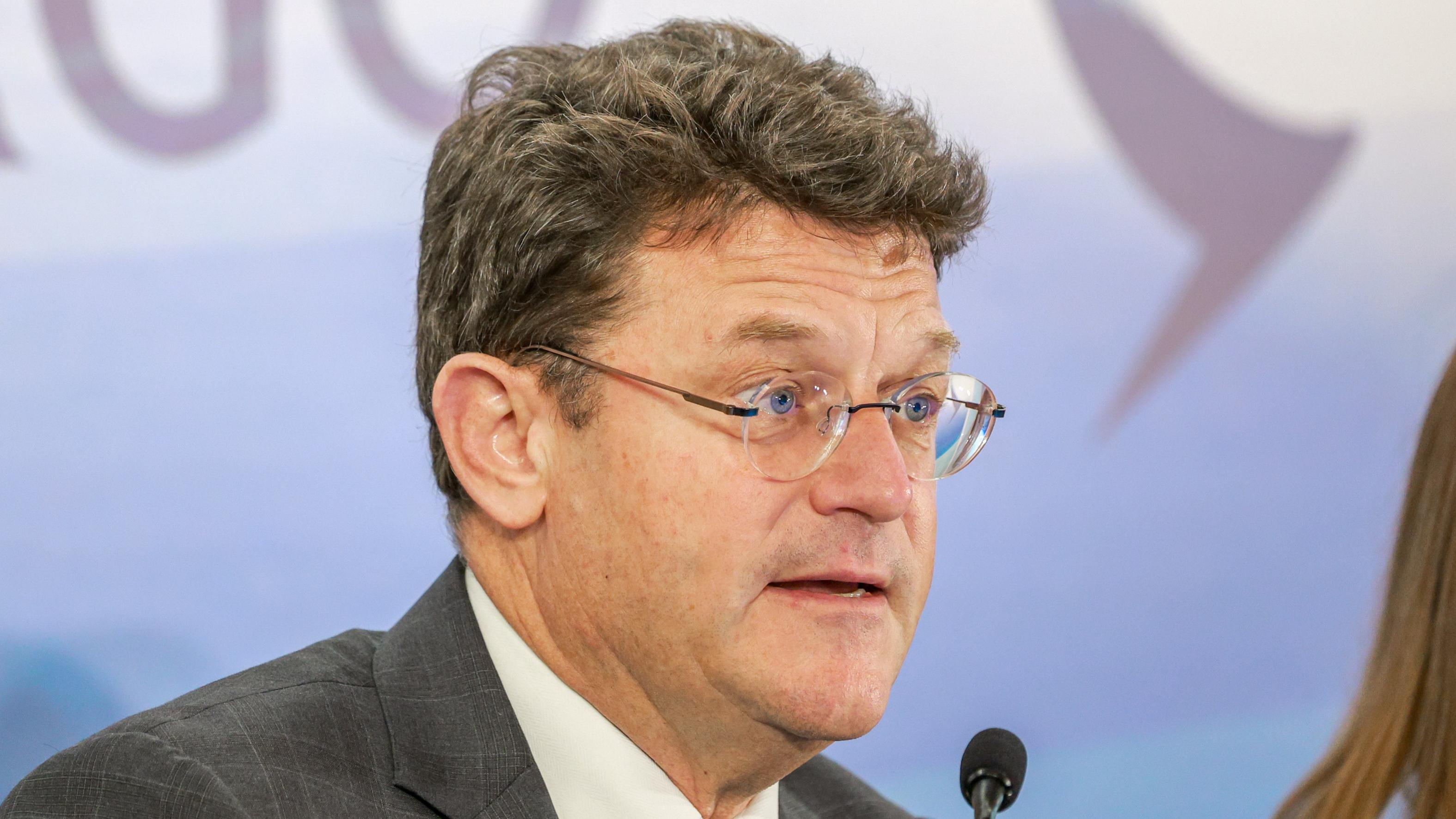 Patrick Healy, Chairman of Cathay Pacific Airways Ltd, attends the airline's news conference at JW Marriot in Admiralty on Aug 9, 2023. (ANDY CHONG / CHINA DAILY)
Patrick Healy, Chairman of Cathay Pacific Airways Ltd, attends the airline's news conference at JW Marriot in Admiralty on Aug 9, 2023. (ANDY CHONG / CHINA DAILY)
Hong Kong’s flagship carrier Cathay Pacific Airways said it will buy back 50 percent of the preference shares held by the Hong Kong Special Administrative Region government by the end of this year as the global aviation industry recovery endows the company with sufficient funds.
The COVID-19-hit airline reported an attributable profit of HK$4.26 billion ($546 million) for the six months ended June 30, compared to a loss of HK$4.99 billion in the previous year. No dividend for ordinary shareholders was declared.
The airline already reached 50 percent of pre-pandemic passenger flight capacity levels covering 70 destinations in March. Looking ahead, Healy envisaged that by the end of this year, Cathay Pacific can achieve 70 percent pre-pandemic passenger flight capacity levels covering 80 destinations
The company also announced it plans to buy back 50 percent of the government-held preference shares by the end of this year at a redemption price of over HK$9.75 billion.
The carrier proposed capital reduction to facilitate the first redemption of preference shares. The credit arising from the proposed capital reduction will be applied to the preference shares reserves account and be used to redeem all of the preference shares.
The company plans to redeem the remaining preference shares by July next year, subject to completion of the proposed capital reduction and its business conditions.
ALSO READ: Cathay Pacific still has to up its game
“The group plans to buy back 50 percent of the preference shares before the end of 2023, and our results for the six months of 2023 demonstrate that we are on the right track,” Cathay Pacific Airways Chair Patrick Healy announced at press conference on Wednesday.
The chairman highlighted that the carrier has generated operating cash so far this year and its available unrestricted liquidity balance was HK$28.9 billion as at June 30.
In the reporting period, the group’s passenger services revenue skyrocketed over 12 times to HK$27.56 billion due to the revival of travel, while its cargo services revenue decreased 10 percent to HK$ 12.43 billion owing to weaker global demand.
To ride out from the economic storm of the COVID-19 pandemic, the embattled airline in June 2020 announced a HK$39 billion recapitalization plan, comprising an issuance of preference shares worth of HK19.5 billion with detachable warrants to the Hong Kong SAR government, a share rights issuance of HK$11.7 billion, and a bridging loan facility of HK$7.8 billion.
The interim result announcement on Wednesday said the company in June has paid the deferred dividend of HK$1.52 billion on the preference shares held by the government to bring dividend payments up-to-date. The statement added that the company intends to pay all future preference share dividends as they fall due.
READ MORE: Cathay suspends crewmembers accused of discrimination
“Cathay Pacific Airways is slowly climbing out of the COVID-19 slump. We do not foresee any additional lending by (majority shareholder) Swire Pacific to the airline over the next one to two years,” S&P Global Ratings noted.
The S&P report added pilot availability, operational difficulties, and potential reputation damage from recent events could complicate the airline's recovery. “We have not factored in any dividend contributions from the airline to Swire Pacific for the next three years.”
The airline already reached 50 percent of pre-pandemic passenger flight capacity levels covering 70 destinations in March. Looking ahead, Healy envisaged that by the end of this year, Cathay Pacific can achieve 70 percent pre-pandemic passenger flight capacity levels covering 80 destinations, and should reach 100 percent level by the end of next year.
“The Three-Runway System becomes fully operational by the end of next year, and the huge potential of the Guangdong-Hong Kong-Macao Greater Bay Area gives us great optimism for the future,” Healy said.
Tiger Faith Asset Management investment strategy director Conita Hung commented: “Wednesday’s announcement reflects that the airline’s financial capability has improved quite a lot but I do not think it will be a great catalyst to boost share price because the business improvement factor has already been priced-in.” She added the airline’s cargo business in the second half of this year may be affected by a slowing global economy and the current relationship between China and the United States.


